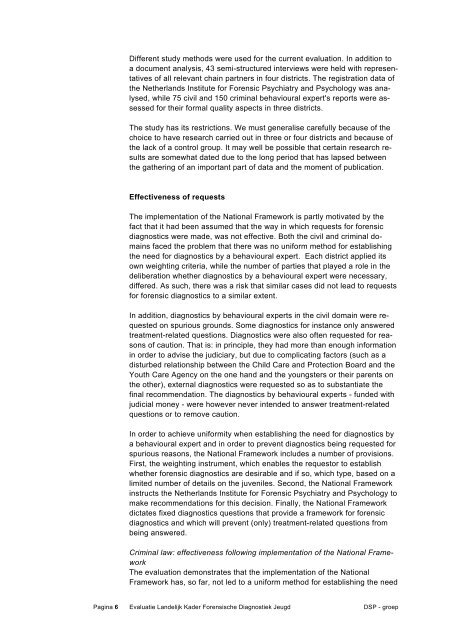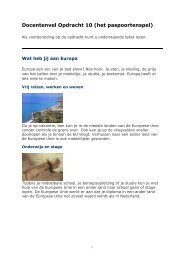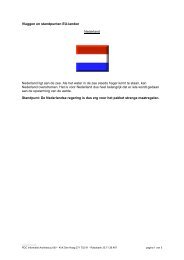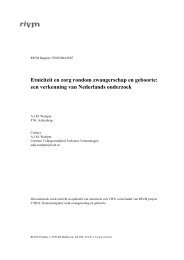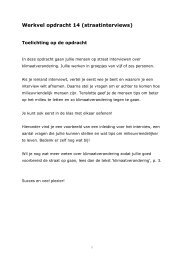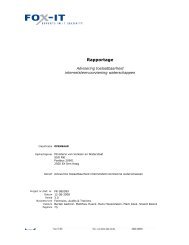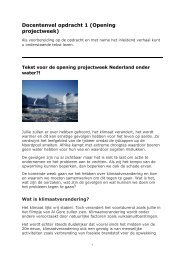Evaluatie Landelijk Kader Forensische ... - Europa morgen
Evaluatie Landelijk Kader Forensische ... - Europa morgen
Evaluatie Landelijk Kader Forensische ... - Europa morgen
You also want an ePaper? Increase the reach of your titles
YUMPU automatically turns print PDFs into web optimized ePapers that Google loves.
Different study methods were used for the current evaluation. In addition to<br />
a document analysis, 43 semi-structured interviews were held with representatives<br />
of all relevant chain partners in four districts. The registration data of<br />
the Netherlands Institute for Forensic Psychiatry and Psychology was analysed,<br />
while 75 civil and 150 criminal behavioural expert's reports were assessed<br />
for their formal quality aspects in three districts.<br />
The study has its restrictions. We must generalise carefully because of the<br />
choice to have research carried out in three or four districts and because of<br />
the lack of a control group. It may well be possible that certain research results<br />
are somewhat dated due to the long period that has lapsed between<br />
the gathering of an important part of data and the moment of publication.<br />
Effectiveness of requests<br />
The implementation of the National Framework is partly motivated by the<br />
fact that it had been assumed that the way in which requests for forensic<br />
diagnostics were made, was not effective. Both the civil and criminal domains<br />
faced the problem that there was no uniform method for establishing<br />
the need for diagnostics by a behavioural expert. Each district applied its<br />
own weighting criteria, while the number of parties that played a role in the<br />
deliberation whether diagnostics by a behavioural expert were necessary,<br />
differed. As such, there was a risk that similar cases did not lead to requests<br />
for forensic diagnostics to a similar extent.<br />
In addition, diagnostics by behavioural experts in the civil domain were requested<br />
on spurious grounds. Some diagnostics for instance only answered<br />
treatment-related questions. Diagnostics were also often requested for reasons<br />
of caution. That is: in principle, they had more than enough information<br />
in order to advise the judiciary, but due to complicating factors (such as a<br />
disturbed relationship between the Child Care and Protection Board and the<br />
Youth Care Agency on the one hand and the youngsters or their parents on<br />
the other), external diagnostics were requested so as to substantiate the<br />
final recommendation. The diagnostics by behavioural experts - funded with<br />
judicial money - were however never intended to answer treatment-related<br />
questions or to remove caution.<br />
In order to achieve uniformity when establishing the need for diagnostics by<br />
a behavioural expert and in order to prevent diagnostics being requested for<br />
spurious reasons, the National Framework includes a number of provisions.<br />
First, the weighting instrument, which enables the requestor to establish<br />
whether forensic diagnostics are desirable and if so, which type, based on a<br />
limited number of details on the juveniles. Second, the National Framework<br />
instructs the Netherlands Institute for Forensic Psychiatry and Psychology to<br />
make recommendations for this decision. Finally, the National Framework<br />
dictates fixed diagnostics questions that provide a framework for forensic<br />
diagnostics and which will prevent (only) treatment-related questions from<br />
being answered.<br />
Criminal law: effectiveness following implementation of the National Framework<br />
The evaluation demonstrates that the implementation of the National<br />
Framework has, so far, not led to a uniform method for establishing the need<br />
Pagina 6 <strong>Evaluatie</strong> <strong>Landelijk</strong> <strong>Kader</strong> <strong>Forensische</strong> Diagnostiek Jeugd DSP - groep


